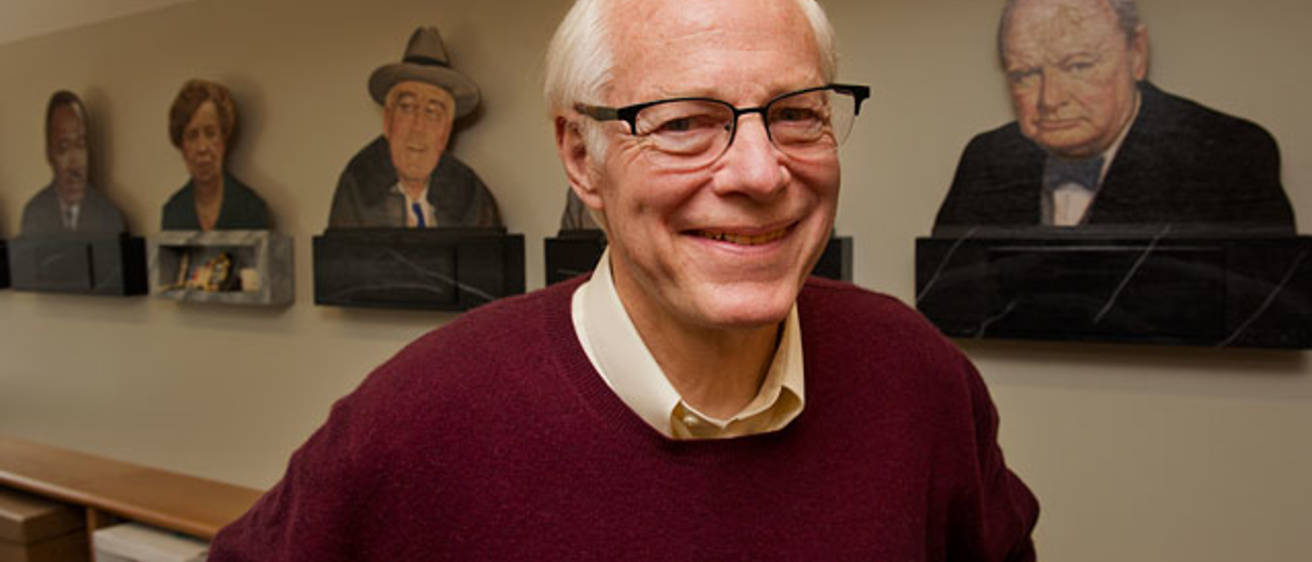Lining the walls of his Boyd Law Building office on the University of Iowa campus are two-dimensional busts of some of the great men and women of history. Franklin and Eleanor Roosevelt. Martin Luther King. Abraham Lincoln. Benjamin Franklin.
The work of Iowa City artists Michael and Connie Roberts, the busts reminded him of the creativity centered in his home state during the many years the former congressman spent in Washington, D.C., and then in Boston and Princeton after his congressional career ended.
He has commissioned over the years more than 30 artworks from the Robertses—busts of his muses, such titanic figures as Winston Churchill, Gandhi, and Sun Yat-sen, founder of the Chinese Republic.
“They are great figures from history whom I respect and who inspire me,” says Leach, a Davenport native and graduate of Princeton and Johns Hopkins universities who spent 30 years as a Republican member of Congress from Iowa.
They reflect a thoughtful, respectful, and endlessly curious mind that can, in a matter of minutes, dissect the latest public policy proposal, summarize the pros and cons of U.S. military intervention around the globe, explore the difference between formative and abstract art, and analyze Dan Gable’s wrestling career. Those qualities earned him a reputation during his Congressional tenure as a wise iconoclast who did what he felt was right.
In 2006, Leach was defeated by Rep. Dave Loebsack, ending a congressional career that began in 1976. But he wasn’t out of work for long. Since leaving Congress, he has taught at Harvard’s Kennedy School of Government and at Princeton and served as chairman of the National Endowment for the Humanities from 2009 until earlier this year.
This fall, Leach, 70, has returned to Iowa and joined the faculty as a visiting professor in the UI College of Law as the University of Iowa Chair in Public Affairs. He will work with the UI Center for Human Rights, advise law students and help secure field placements in Washington, D.C. He’ll give campus lectures on subjects such as foreign policy and teach undergraduate and graduate law courses on American government and the legislative process.
He also drives a black and gold Mini Cooper, which he’s owned for several years, proving his Hawkeye bona fides pre-date his membership on the UI faculty.
What brought you back to Iowa?
I believe my obligation now is to help prepare a new generation of leaders. I enjoy teaching; indeed, I’m honored to be addressed “professor.”
Working with young people helps to focus one’s own thoughts and learn the different perspective of a younger generation. When I was a student, I always thought my professors were unbelievably bright. Now that I’m a teacher, I think, boy, these kids are smart, and wondrously idealistic.
What’s important to you about teaching?
Teaching to me is about trying to get people to think independently and creatively and to learn a set of important values. It should be about helping students form their own judgments and at the same time respect other people and their views. I tell my liberal students to read a good conservative blog, and my conservative students to read a liberal one.
You were a state champion wrestler in high school, are a member of two wrestling halls of fame, and a longtime fan of Dan Gable, so it must be exciting for you to be on the same payroll as he is.
I have two heroes—a scholar statesman named George Kennan and Dan Gable. It’s not just that Dan is a great wrestler, it’s that nobody signifies competitive spirit more than he does. Wrestling rewards pluggers, and I know of no one who’s made more of himself in a chosen field. If you were to see Dan walking down Clinton Street, you’d think, there’s a typical Iowan, the quintessential everyman. But when you see him in a wrestling room, nobody effuses more vitality and competitiveness, and no one has been more able to transfer those qualities to others. He’s arguably the greatest wrestler of the last century, and the greatest coach of any sport.
What’s one of your fondest memories from serving in Congress?
Tip O’Neill, who was the first Speaker of the House I served under, was fiercely partisan but a wonderfully decent individual. I had a rule never to ask favors of colleagues but in an unprecedented act he granted me an unrequested favor. In my second term I was on the Banking Committee and a balancing committee of lesser importance. I aspired also to be on the International Relations Committee and while my party leadership offered me a slot, it was with the proviso that I would have to give up my banking position, so I declined the offer. Tip apparently heard about this relatively minor dilemma and the day before committee designations were to be announced on the House floor, he called the Republican leader of the House and told him the Democrats would add a Republican slot on International Relations but only if it would be given to me. Hence I was able to serve simultaneously on two important committees of the House. I never knew why Tip made this offer but I will always be grateful for his thoughtfulness.
